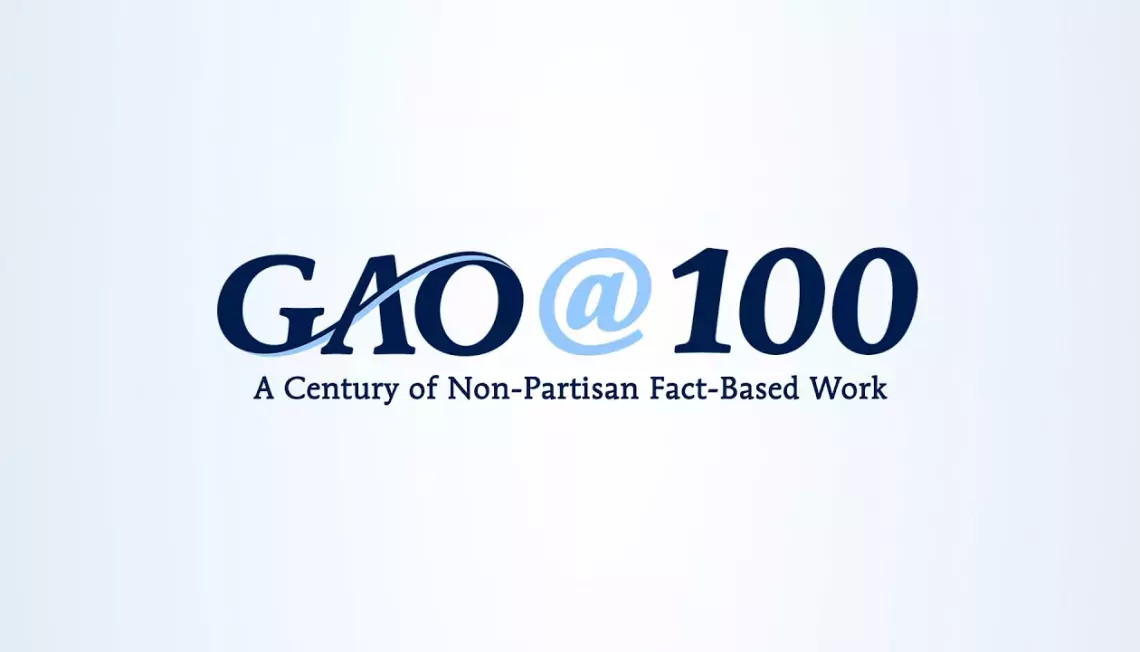Celebrating 100 Years of Making Government Work Better for You
This year marks the 100th anniversary of the founding of the Government Accountability Office. Over the past century, the independent “congressional watchdog” has been presenting the facts on government oversight—pointing out where the federal government is doing well and where it can improve. GAO has made thousands of recommendations to improve services and save taxpayers billions of dollars.
GAO—formerly known as the General Accounting Office—is a trusted, non-partisan advisor to Congress, a proud defender of public interest, and a leading advocate for better government. From cybersecurity to social security, missiles to Medicaid, and foreign policy to public health policy and the global pandemic, GAO works to hold government programs accountable to all Americans.
Today’s WatchBlog post explores our history, accomplishments and future. You can also learn more by watching the below video message from Gene Dodaro, the U.S. Comptroller General and head of GAO.
Our history
GAO was founded in 1921 when Congress realized the need to control growing government expenditures and debt after World War I. Congress passed the Budget and Accounting Act of 1921—requiring the President to issue an annual budget and establishing an independent agency—the General Accounting Office—to track federal spending. The original act can still be seen today in the vaults of the National Archives.
In the early years, we mainly reviewed paperwork documenting payments and purchases from agencies across the federal government. After World War II, however, we began to conduct more comprehensive financial audits. The focus of our work shifted toward helping Congress monitor executive branch agencies’ programs and spending.
Through the years, the agency has monitored military spending during the Vietnam War. During the 1960s, we evaluated the Great Society’s anti-poverty efforts. In the 1970s, GAO took on important reviews addressing energy policy, consumer protection, and the environment.
During the 1980s, we raised a red flag about problems in the savings and loan industry. And in the 1990s, we designated cybersecurity a high-risk area across the federal government.
Who we are today
Today, our work takes an expansive look at federal programs—not just how much is spent, but how well that money is spent. To reflect this expanded role, we changed our name in 2004 to the Government Accountability Office.
In the early 2000s, during the Great Recession, GAO played a key role examining the health of our financial institutions and efforts to stimulate the economy.
More recently, we have looked at contemporary issues like opioid addiction, the gig economy, affordable housing, and food safety. The agency has also established a new science and technology team to meet Congress’ growing need for information on the cutting edge issues like artificial intelligence and infectious disease modeling. And we are looking closely at the overlap and duplication of federal programs as well as those programs at high risk of not meeting their objectives.
Most recently, we have been tracking spending under the $2.6 trillion coronavirus response legislation. And we’re assessing the impact of those relief efforts on public health and the economy.
Each year, we issue hundreds of reports and testify before dozens of congressional committees and subcommittees on the issues affecting our nation.
GAO remains one of the best values in government, too. The financial benefits for our work in FY 2020 alone totaled $77.6 billion. That’s a return of about $114 on every dollar invested in GAO.
Our future
As we begin the next century of service, GAO will continue in its “watchdog” role—advising Congress about the multitude of complicated domestic and international issues facing the nation. We will continue to identify opportunities to save money, put government on a more fiscally-sustainable path, and help programs become more effective so that they work in the best interest of serving the American people. As it has for the past 100 years, GAO will continue to provide policy makers with the facts and analyses they need to make informed decisions.
Over the coming year, we’ll be sharing highlights from our storied history and our groundbreaking work. And we’ll even take a closer look at how the diversity of our staff plays a critical role in our ability to carry out non-partisan, unbiased work.
Happy 100th birthday GAO!
GAO Contacts
Related Products

GAO's mission is to provide Congress with fact-based, nonpartisan information that can help improve federal government performance and ensure accountability for the benefit of the American people. GAO launched its WatchBlog in January, 2014, as part of its continuing effort to reach its audiences—Congress and the American people—where they are currently looking for information.
The blog format allows GAO to provide a little more context about its work than it can offer on its other social media platforms. Posts will tie GAO work to current events and the news; show how GAO’s work is affecting agencies or legislation; highlight reports, testimonies, and issue areas where GAO does work; and provide information about GAO itself, among other things.
Please send any feedback on GAO's WatchBlog to blog@gao.gov.





